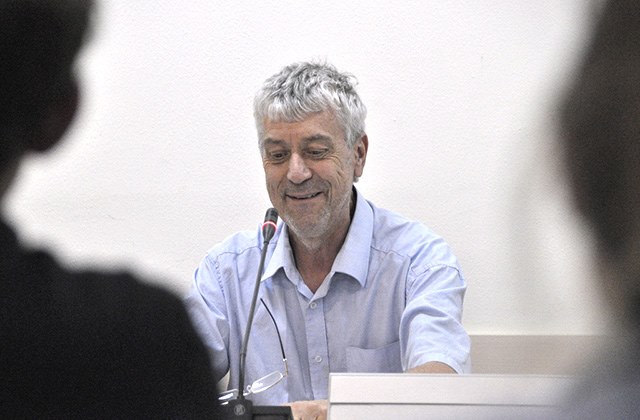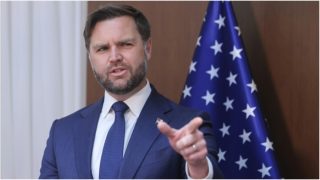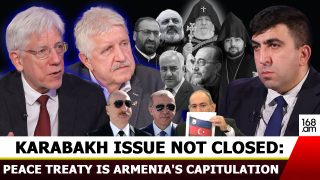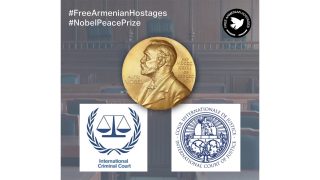What does Armenia attempt to extract from Karabakh negotiations?

Recently OSE MG Co-Chairs—the USA and Russia uncovered new details on NK conflict peaceful settlement in case, when official negotiations don’t exist.
After OSCE MG American Co-Chair Richard Hoagland stated during his regional visit to Yerevan that there is a good settlement package on the negotiation table, which he didn’t exclude that was developed by the Russian side and is known to the public as “Lavrov’s plan”, Russian FM Sergey Lavrov in an interview with Azeri Press once again denied existence of “Lavrov’s plan” in Artsakh conflict settlement. “I have publicly stated on many occasions that there is no Lavrov’s Plan. The ideas that are now up for discussion are based on the proposals worked out collectively by the three states co-chairs of the OSCE Minsk Group,” Lavrov said.
And in an interview with APA agency Russian FM stated that a few issues remained in NK conflict settlement and they are the most complicated.
“We aren’t indifferent toward what happens in our neighboring region. We are interested that peace was established there, borders were opened, refugees returned, trade and economy ties have been restored. For this very reason NK conflict settlement is among the priorities of our foreign policy,” Lavrov said.
He added that NK issue settlement hold an important place during the meetings of Vladimir Putin with leaders of Azerbaijan and Armenia. In particular, according to the Minister that issue has been subjectively touched upon on March 15 during Armenian president Serzh Sargsyan’s visit to Moscow.
The latter also stated that alongside with this many aspects have already been agreed and a few issues are left, which are the most complicated. Moreover, recently First Armenian president, ANC head Levon Ter-Petrosyan, who brought Artsakh issue into Armenia’s pre-election agenda in his last two interviews touched upon “a few unsettled issues”.
German analyst Uwe Halbach told “168 Hours” that information provided by Hoagland and Lavrov a bit simplifies the impression that in the settlement negotiations a deadlock has been established.
In his words after the April War during the meetings in Vienna and St. Petersburg alongside with the proposal of installation of control mechanisms, a package was introduced on the diplomatic table developed by the Russian side.
“There is an impression that Armenia has some reservations linked to that proposal, due to which it stresses installation of investigative mechanisms, which Azerbaijan refuses. The latter intends to shift to the agreement on negotiations, to which it seems not to contradict, which was proven, when Aliyev touched upon Karabakh’s autonomy and pressures.
Let me remind about Armenian president Serzh Sargsyan’s interview with one of international media outlets months ago, that Armenia was ready to Kazan document, which Azerbaijan refused. There was an impression that currently Armenia won’t agree to such a document and it isn’t excluded that Armenia attempts to bargain, subject of which is number of territories to be returned and details around NK status,” Uwe Halbach said.
According to the latter these are the very “few uncoordinated” issues, on which recently the diplomats are touching upon. According to the German analyst the deadlock partially was created for the reason that Azerbaijan refuses to invest control mechanisms, and Armenia—to continue negotiations around the proposal submitted by OSCE MG. The German analyst attached attention to another circumstance.
“Lavrov also stated on Azerbaijan’s possible membership to EEU in his interview. It’s known that some Azerbaijani circles in negotiations with Moscow attempt to circulate this issue to gain Russian support in NK conflict settlement. It isn’t excluded that Armenia is taking into account this possible detail of “Karabakh deal”, for that reason refusing to negotiate around Russian proposal. The situation is really complicated, it’s good that mediators actively touch upon it and the process doesn’t fade,” Halbach said.
As for the superpowers the German analyst insists that NK conflict settlement is both a priority and not so much, as the world is on the threshold of serious changes.
“Those changes are numeorus for Russia: Middle East, Ukraine, Eastern Europe, then elections in France and Germany, which are in the center of Russia’s attention, Trump’s administration. The US still proceeds with its traditional policy, however, it’s yet unknown how the appointed Co-Chair will function and what American interests he’ll put forward, as Trump is really an unpredictable figure, who attempts to introduce certain changes, make surprises both for Europe and Russia,” German analyst said.
By Araks Martirosyan

























